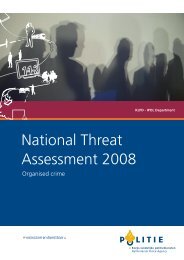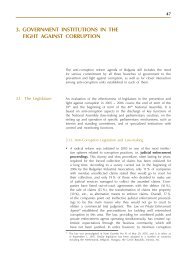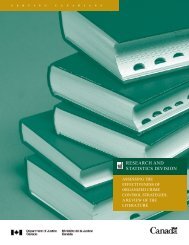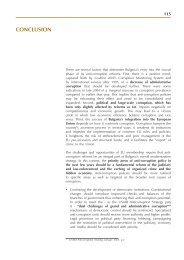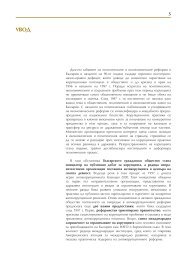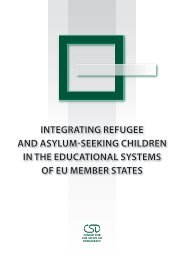5. Civil Society against Corruption (PDF, 293 kb)
5. Civil Society against Corruption (PDF, 293 kb)
5. Civil Society against Corruption (PDF, 293 kb)
Create successful ePaper yourself
Turn your PDF publications into a flip-book with our unique Google optimized e-Paper software.
112 ANTI-CORRUPTION REFORMS IN BULGARIA<br />
CHART 33. DISTRIBUTION OF CORRUPTION-RELATED ITEMS BY GENRE<br />
800<br />
700<br />
600<br />
500<br />
400<br />
300<br />
200<br />
100<br />
0<br />
688<br />
Information<br />
147<br />
Interview<br />
Source: Media Monitoring by Coalition 2000<br />
265<br />
Analysis<br />
23 14<br />
Investigative<br />
report<br />
Editorial<br />
Investigative journalism is<br />
the most high-risk professional<br />
commitment as well as the<br />
costliest investment and serious<br />
media cannot afford to ignore<br />
it. It is still underused, though,<br />
since shortage of financial<br />
resources and a heavy reliance<br />
on advertising, typical of a most<br />
Bulgarian media, drive them to<br />
focus on more conventional<br />
reporting genres and general<br />
information. Investigative<br />
journalism is still viewed as a<br />
luxury that is not necessarily<br />
warranted and one that may,<br />
in the event of a clash of<br />
interests, affect the survival of<br />
the respective media.<br />
Journalistic disclosures still have a very low “life expectancy”. The blame<br />
is to be shared by the respective reporters/media and public authorities<br />
who for the most part still tend to ignore the investigative reports. On<br />
the other hand, there are also the stories aimed at discrediting particular<br />
public figures or organizations. Smear campaigns are part of the media<br />
landscape and tend to proliferate in periods of major political events,<br />
election times in particular. It is a professional test for journalism how<br />
susceptible the media are to this type of abuse of their public power,<br />
more often than not proving to be the turf of former and current<br />
officials in the security sector. One alarming tendency, however, is the<br />
tacit taboo in the professional community on publications concerning<br />
corruption in the media themselves.<br />
The media have undeniably managed to demonstrate that a wide<br />
range of dubious practices in Bulgarian society are in fact corruption.<br />
They have raised public sensitivity and encouraged intolerance to a<br />
broad spectrum of corrupt actions. They have also coined a matching<br />
discourse for the public to use in the debate on corruption.<br />
The media are now not simply reporting law enforcement action <strong>against</strong><br />
corruption but publish facts which need further investigation. In this,<br />
besides the usual methods reporters rely more on whistleblowers and<br />
on non-governmental organizations. There are already numerous good<br />
practices where the media, civic organizations, law-enforcement bodies,<br />
and the public administration form effective coalitions. They, however,<br />
rarely outlive the particular purpose of their formation.<br />
In the last few years certain pieces of legislation related to judicial and<br />
economic reform were highlighted by some print and broadcast media<br />
because of the corruption risks involved. This was a good example how<br />
the media can do valuable preventive work as well.



